Early Childhood Education: Research Methodology Analysis Report
VerifiedAdded on 2023/06/08
|7
|2095
|255
Report
AI Summary
This report provides a comprehensive analysis of two research articles focused on early childhood education, one employing a qualitative approach and the other a quantitative or mixed-methods approach. The report examines the methodologies used in each article, critically appraising their strengths and weaknesses. The qualitative research article explores the categorization of risky play in preschool settings through observations and interviews, identifying six key categories. The quantitative article assesses the features of recommended no-cost and cost e-books for preschoolers. The report supports its discussion with references to course readings and wider research, providing a comparative analysis of the research methods and their effectiveness in the context of early childhood education. The analysis considers how the chosen methodologies contribute to the understanding of early childhood development and learning, addressing issues like the balance between safety and stimulation in play, and the impact of technology in early learning.
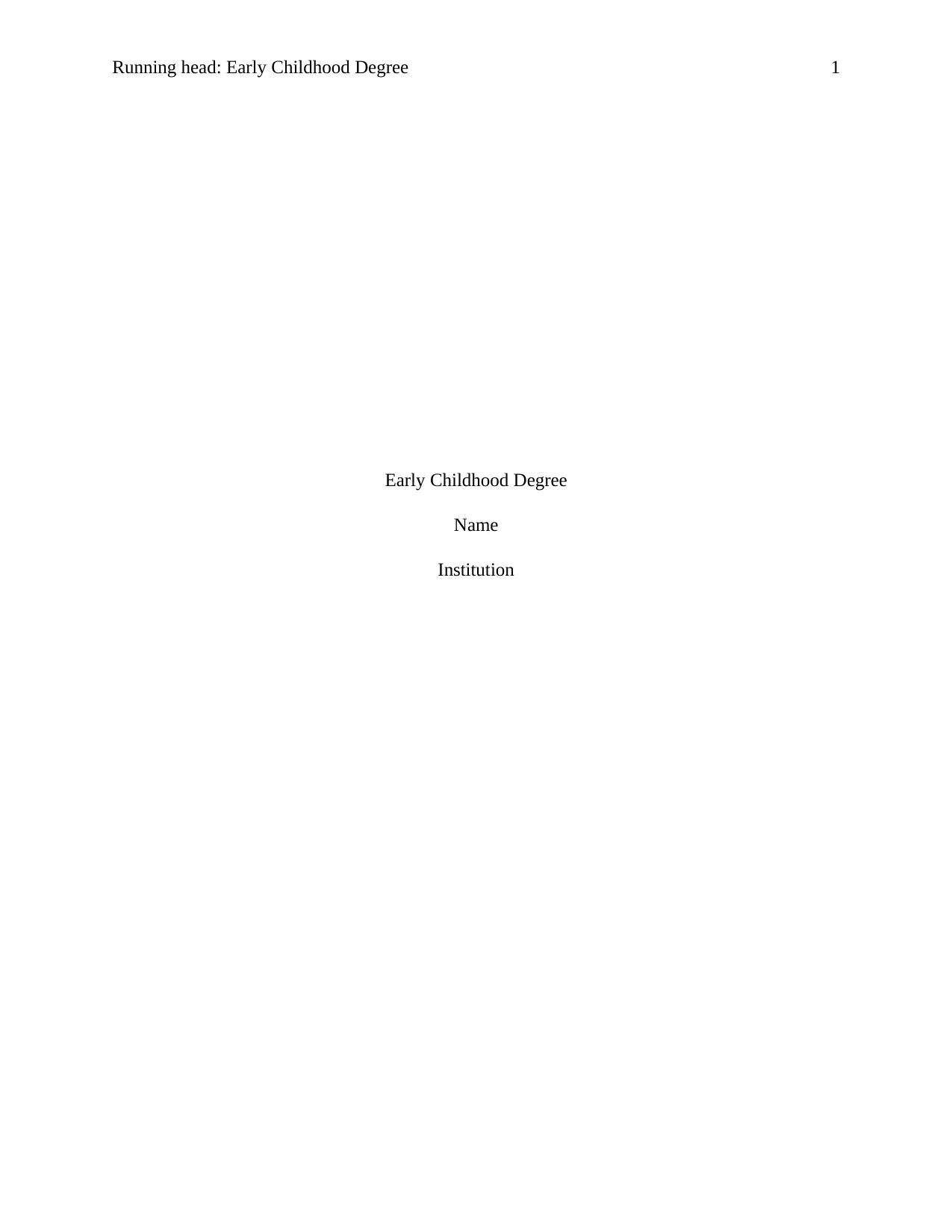
Running head: Early Childhood Degree 1
Early Childhood Degree
Name
Institution
Early Childhood Degree
Name
Institution
Paraphrase This Document
Need a fresh take? Get an instant paraphrase of this document with our AI Paraphraser
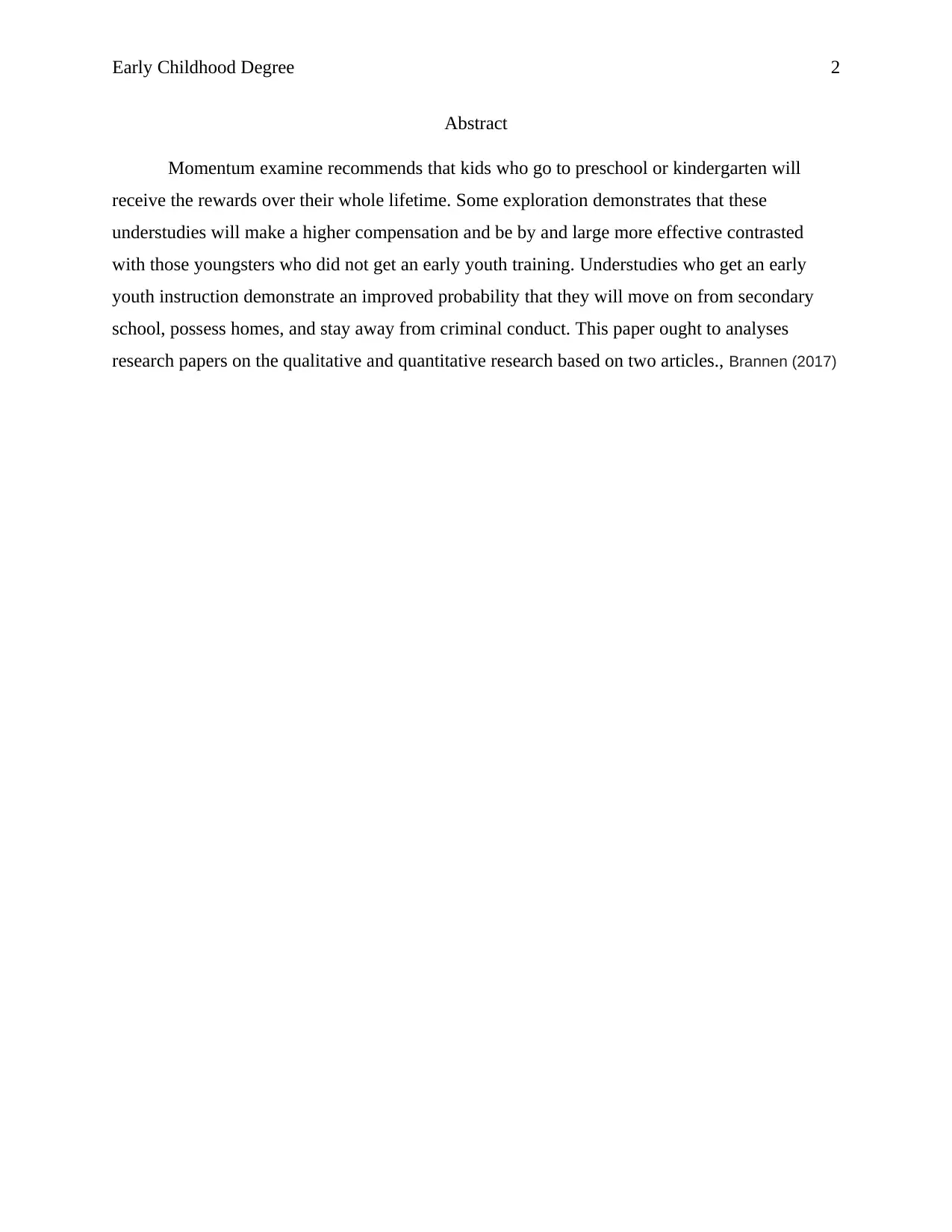
Early Childhood Degree 2
Abstract
Momentum examine recommends that kids who go to preschool or kindergarten will
receive the rewards over their whole lifetime. Some exploration demonstrates that these
understudies will make a higher compensation and be by and large more effective contrasted
with those youngsters who did not get an early youth training. Understudies who get an early
youth instruction demonstrate an improved probability that they will move on from secondary
school, possess homes, and stay away from criminal conduct. This paper ought to analyses
research papers on the qualitative and quantitative research based on two articles., Brannen (2017)
Abstract
Momentum examine recommends that kids who go to preschool or kindergarten will
receive the rewards over their whole lifetime. Some exploration demonstrates that these
understudies will make a higher compensation and be by and large more effective contrasted
with those youngsters who did not get an early youth training. Understudies who get an early
youth instruction demonstrate an improved probability that they will move on from secondary
school, possess homes, and stay away from criminal conduct. This paper ought to analyses
research papers on the qualitative and quantitative research based on two articles., Brannen (2017)
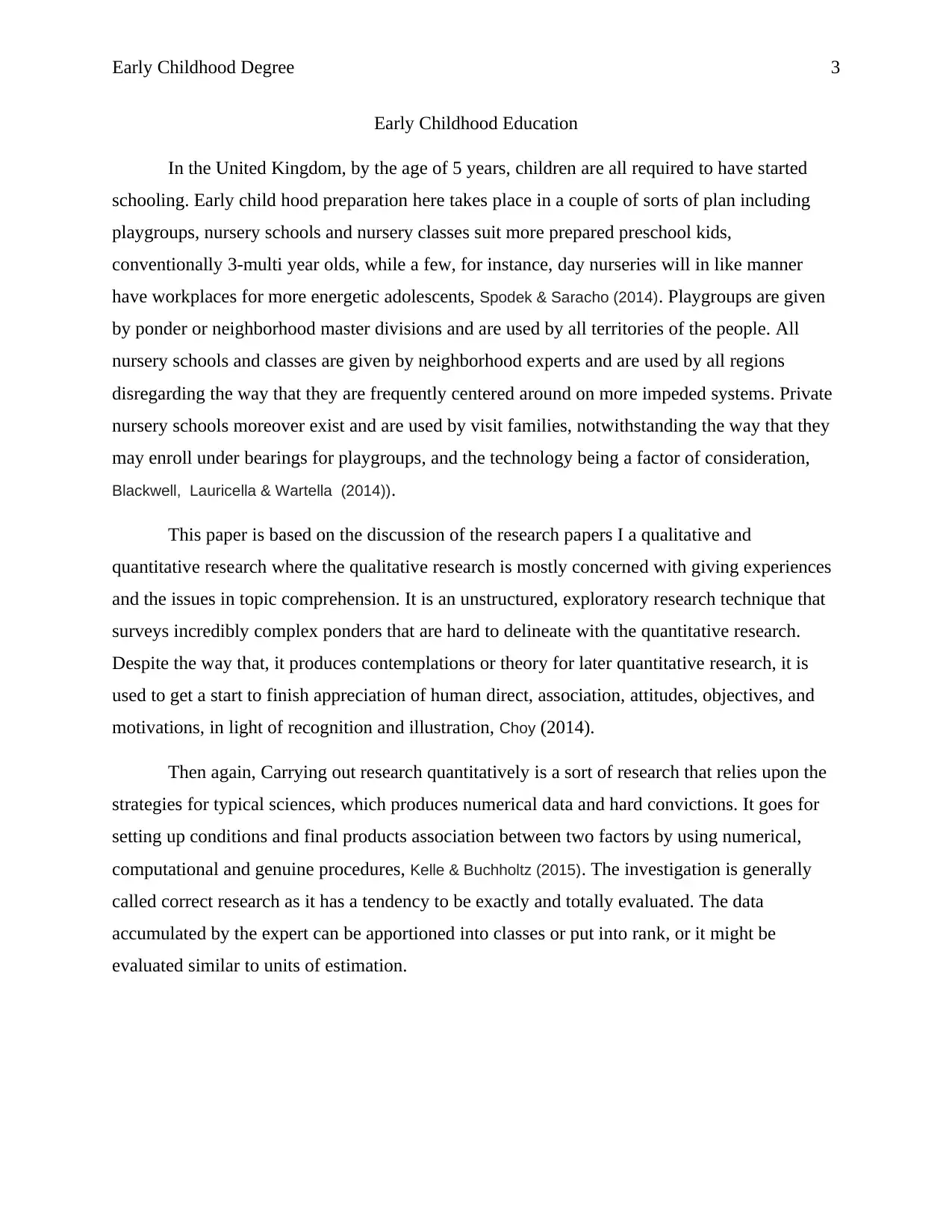
Early Childhood Degree 3
Early Childhood Education
In the United Kingdom, by the age of 5 years, children are all required to have started
schooling. Early child hood preparation here takes place in a couple of sorts of plan including
playgroups, nursery schools and nursery classes suit more prepared preschool kids,
conventionally 3-multi year olds, while a few, for instance, day nurseries will in like manner
have workplaces for more energetic adolescents, Spodek & Saracho (2014). Playgroups are given
by ponder or neighborhood master divisions and are used by all territories of the people. All
nursery schools and classes are given by neighborhood experts and are used by all regions
disregarding the way that they are frequently centered around on more impeded systems. Private
nursery schools moreover exist and are used by visit families, notwithstanding the way that they
may enroll under bearings for playgroups, and the technology being a factor of consideration,
Blackwell, Lauricella & Wartella (2014)).
This paper is based on the discussion of the research papers I a qualitative and
quantitative research where the qualitative research is mostly concerned with giving experiences
and the issues in topic comprehension. It is an unstructured, exploratory research technique that
surveys incredibly complex ponders that are hard to delineate with the quantitative research.
Despite the way that, it produces contemplations or theory for later quantitative research, it is
used to get a start to finish appreciation of human direct, association, attitudes, objectives, and
motivations, in light of recognition and illustration, Choy (2014).
Then again, Carrying out research quantitatively is a sort of research that relies upon the
strategies for typical sciences, which produces numerical data and hard convictions. It goes for
setting up conditions and final products association between two factors by using numerical,
computational and genuine procedures, Kelle & Buchholtz (2015). The investigation is generally
called correct research as it has a tendency to be exactly and totally evaluated. The data
accumulated by the expert can be apportioned into classes or put into rank, or it might be
evaluated similar to units of estimation.
Early Childhood Education
In the United Kingdom, by the age of 5 years, children are all required to have started
schooling. Early child hood preparation here takes place in a couple of sorts of plan including
playgroups, nursery schools and nursery classes suit more prepared preschool kids,
conventionally 3-multi year olds, while a few, for instance, day nurseries will in like manner
have workplaces for more energetic adolescents, Spodek & Saracho (2014). Playgroups are given
by ponder or neighborhood master divisions and are used by all territories of the people. All
nursery schools and classes are given by neighborhood experts and are used by all regions
disregarding the way that they are frequently centered around on more impeded systems. Private
nursery schools moreover exist and are used by visit families, notwithstanding the way that they
may enroll under bearings for playgroups, and the technology being a factor of consideration,
Blackwell, Lauricella & Wartella (2014)).
This paper is based on the discussion of the research papers I a qualitative and
quantitative research where the qualitative research is mostly concerned with giving experiences
and the issues in topic comprehension. It is an unstructured, exploratory research technique that
surveys incredibly complex ponders that are hard to delineate with the quantitative research.
Despite the way that, it produces contemplations or theory for later quantitative research, it is
used to get a start to finish appreciation of human direct, association, attitudes, objectives, and
motivations, in light of recognition and illustration, Choy (2014).
Then again, Carrying out research quantitatively is a sort of research that relies upon the
strategies for typical sciences, which produces numerical data and hard convictions. It goes for
setting up conditions and final products association between two factors by using numerical,
computational and genuine procedures, Kelle & Buchholtz (2015). The investigation is generally
called correct research as it has a tendency to be exactly and totally evaluated. The data
accumulated by the expert can be apportioned into classes or put into rank, or it might be
evaluated similar to units of estimation.
⊘ This is a preview!⊘
Do you want full access?
Subscribe today to unlock all pages.

Trusted by 1+ million students worldwide
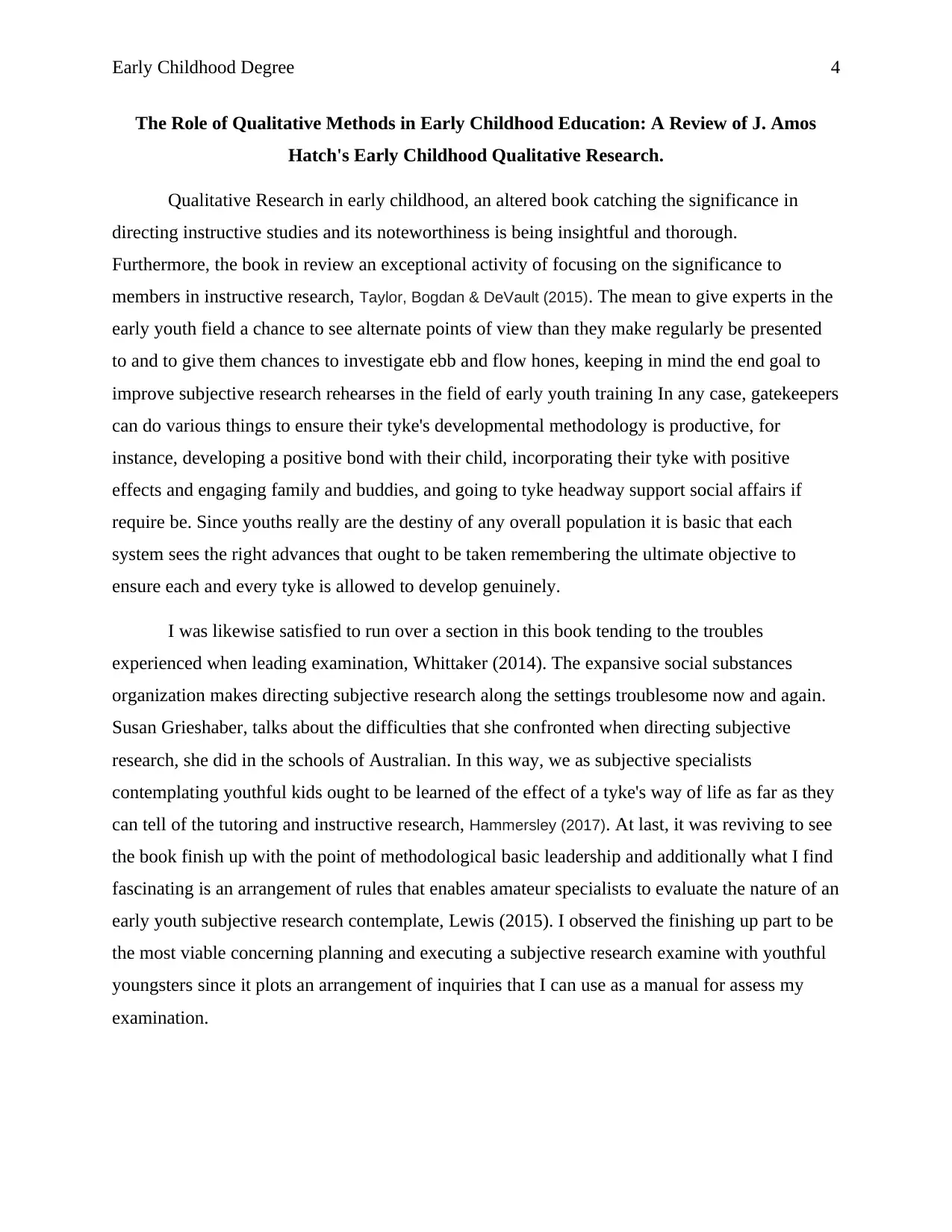
Early Childhood Degree 4
The Role of Qualitative Methods in Early Childhood Education: A Review of J. Amos
Hatch's Early Childhood Qualitative Research.
Qualitative Research in early childhood, an altered book catching the significance in
directing instructive studies and its noteworthiness is being insightful and thorough.
Furthermore, the book in review an exceptional activity of focusing on the significance to
members in instructive research, Taylor, Bogdan & DeVault (2015). The mean to give experts in the
early youth field a chance to see alternate points of view than they make regularly be presented
to and to give them chances to investigate ebb and flow hones, keeping in mind the end goal to
improve subjective research rehearses in the field of early youth training In any case, gatekeepers
can do various things to ensure their tyke's developmental methodology is productive, for
instance, developing a positive bond with their child, incorporating their tyke with positive
effects and engaging family and buddies, and going to tyke headway support social affairs if
require be. Since youths really are the destiny of any overall population it is basic that each
system sees the right advances that ought to be taken remembering the ultimate objective to
ensure each and every tyke is allowed to develop genuinely.
I was likewise satisfied to run over a section in this book tending to the troubles
experienced when leading examination, Whittaker (2014). The expansive social substances
organization makes directing subjective research along the settings troublesome now and again.
Susan Grieshaber, talks about the difficulties that she confronted when directing subjective
research, she did in the schools of Australian. In this way, we as subjective specialists
contemplating youthful kids ought to be learned of the effect of a tyke's way of life as far as they
can tell of the tutoring and instructive research, Hammersley (2017). At last, it was reviving to see
the book finish up with the point of methodological basic leadership and additionally what I find
fascinating is an arrangement of rules that enables amateur specialists to evaluate the nature of an
early youth subjective research contemplate, Lewis (2015). I observed the finishing up part to be
the most viable concerning planning and executing a subjective research examine with youthful
youngsters since it plots an arrangement of inquiries that I can use as a manual for assess my
examination.
The Role of Qualitative Methods in Early Childhood Education: A Review of J. Amos
Hatch's Early Childhood Qualitative Research.
Qualitative Research in early childhood, an altered book catching the significance in
directing instructive studies and its noteworthiness is being insightful and thorough.
Furthermore, the book in review an exceptional activity of focusing on the significance to
members in instructive research, Taylor, Bogdan & DeVault (2015). The mean to give experts in the
early youth field a chance to see alternate points of view than they make regularly be presented
to and to give them chances to investigate ebb and flow hones, keeping in mind the end goal to
improve subjective research rehearses in the field of early youth training In any case, gatekeepers
can do various things to ensure their tyke's developmental methodology is productive, for
instance, developing a positive bond with their child, incorporating their tyke with positive
effects and engaging family and buddies, and going to tyke headway support social affairs if
require be. Since youths really are the destiny of any overall population it is basic that each
system sees the right advances that ought to be taken remembering the ultimate objective to
ensure each and every tyke is allowed to develop genuinely.
I was likewise satisfied to run over a section in this book tending to the troubles
experienced when leading examination, Whittaker (2014). The expansive social substances
organization makes directing subjective research along the settings troublesome now and again.
Susan Grieshaber, talks about the difficulties that she confronted when directing subjective
research, she did in the schools of Australian. In this way, we as subjective specialists
contemplating youthful kids ought to be learned of the effect of a tyke's way of life as far as they
can tell of the tutoring and instructive research, Hammersley (2017). At last, it was reviving to see
the book finish up with the point of methodological basic leadership and additionally what I find
fascinating is an arrangement of rules that enables amateur specialists to evaluate the nature of an
early youth subjective research contemplate, Lewis (2015). I observed the finishing up part to be
the most viable concerning planning and executing a subjective research examine with youthful
youngsters since it plots an arrangement of inquiries that I can use as a manual for assess my
examination.
Paraphrase This Document
Need a fresh take? Get an instant paraphrase of this document with our AI Paraphraser
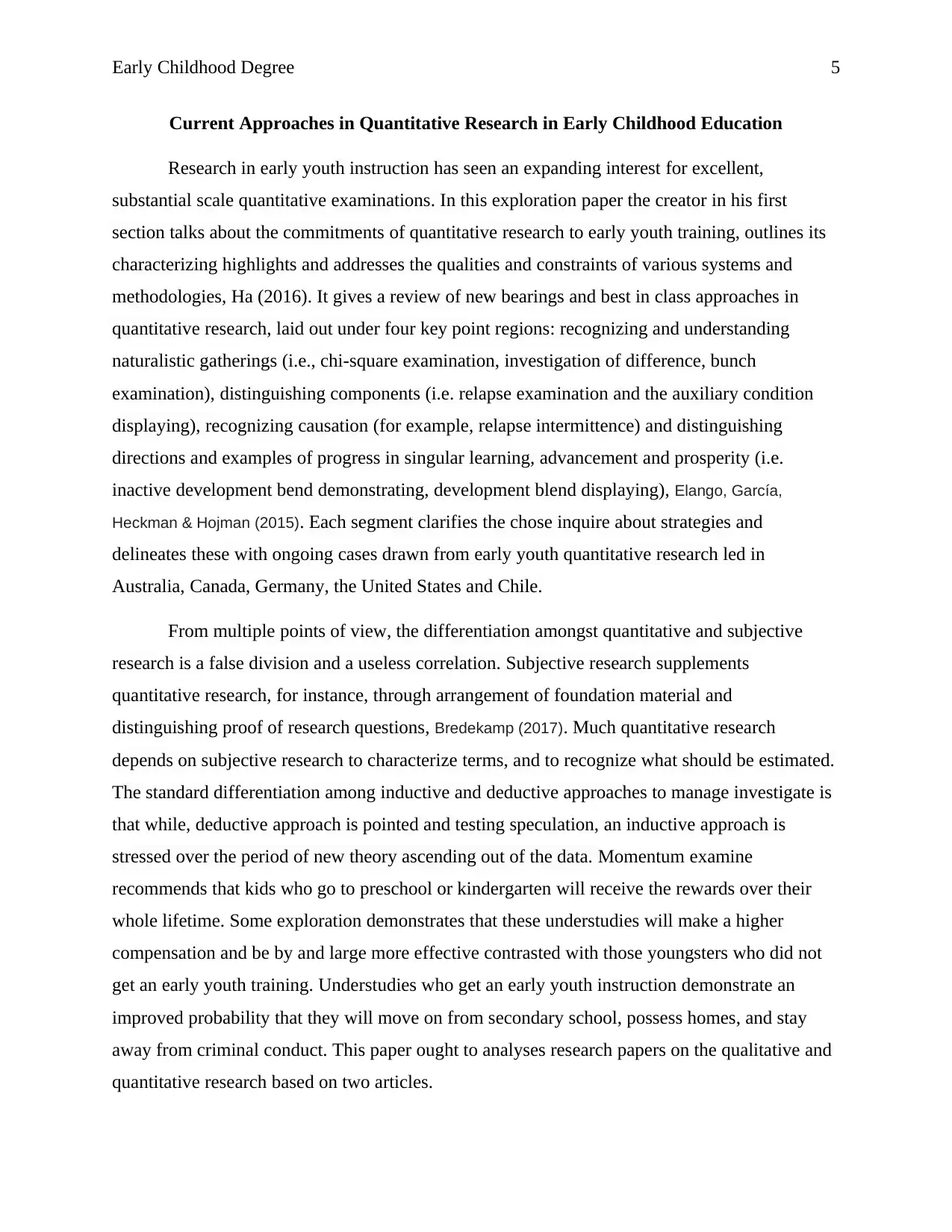
Early Childhood Degree 5
Current Approaches in Quantitative Research in Early Childhood Education
Research in early youth instruction has seen an expanding interest for excellent,
substantial scale quantitative examinations. In this exploration paper the creator in his first
section talks about the commitments of quantitative research to early youth training, outlines its
characterizing highlights and addresses the qualities and constraints of various systems and
methodologies, Ha (2016). It gives a review of new bearings and best in class approaches in
quantitative research, laid out under four key point regions: recognizing and understanding
naturalistic gatherings (i.e., chi-square examination, investigation of difference, bunch
examination), distinguishing components (i.e. relapse examination and the auxiliary condition
displaying), recognizing causation (for example, relapse intermittence) and distinguishing
directions and examples of progress in singular learning, advancement and prosperity (i.e.
inactive development bend demonstrating, development blend displaying), Elango, García,
Heckman & Hojman (2015). Each segment clarifies the chose inquire about strategies and
delineates these with ongoing cases drawn from early youth quantitative research led in
Australia, Canada, Germany, the United States and Chile.
From multiple points of view, the differentiation amongst quantitative and subjective
research is a false division and a useless correlation. Subjective research supplements
quantitative research, for instance, through arrangement of foundation material and
distinguishing proof of research questions, Bredekamp (2017). Much quantitative research
depends on subjective research to characterize terms, and to recognize what should be estimated.
The standard differentiation among inductive and deductive approaches to manage investigate is
that while, deductive approach is pointed and testing speculation, an inductive approach is
stressed over the period of new theory ascending out of the data. Momentum examine
recommends that kids who go to preschool or kindergarten will receive the rewards over their
whole lifetime. Some exploration demonstrates that these understudies will make a higher
compensation and be by and large more effective contrasted with those youngsters who did not
get an early youth training. Understudies who get an early youth instruction demonstrate an
improved probability that they will move on from secondary school, possess homes, and stay
away from criminal conduct. This paper ought to analyses research papers on the qualitative and
quantitative research based on two articles.
Current Approaches in Quantitative Research in Early Childhood Education
Research in early youth instruction has seen an expanding interest for excellent,
substantial scale quantitative examinations. In this exploration paper the creator in his first
section talks about the commitments of quantitative research to early youth training, outlines its
characterizing highlights and addresses the qualities and constraints of various systems and
methodologies, Ha (2016). It gives a review of new bearings and best in class approaches in
quantitative research, laid out under four key point regions: recognizing and understanding
naturalistic gatherings (i.e., chi-square examination, investigation of difference, bunch
examination), distinguishing components (i.e. relapse examination and the auxiliary condition
displaying), recognizing causation (for example, relapse intermittence) and distinguishing
directions and examples of progress in singular learning, advancement and prosperity (i.e.
inactive development bend demonstrating, development blend displaying), Elango, García,
Heckman & Hojman (2015). Each segment clarifies the chose inquire about strategies and
delineates these with ongoing cases drawn from early youth quantitative research led in
Australia, Canada, Germany, the United States and Chile.
From multiple points of view, the differentiation amongst quantitative and subjective
research is a false division and a useless correlation. Subjective research supplements
quantitative research, for instance, through arrangement of foundation material and
distinguishing proof of research questions, Bredekamp (2017). Much quantitative research
depends on subjective research to characterize terms, and to recognize what should be estimated.
The standard differentiation among inductive and deductive approaches to manage investigate is
that while, deductive approach is pointed and testing speculation, an inductive approach is
stressed over the period of new theory ascending out of the data. Momentum examine
recommends that kids who go to preschool or kindergarten will receive the rewards over their
whole lifetime. Some exploration demonstrates that these understudies will make a higher
compensation and be by and large more effective contrasted with those youngsters who did not
get an early youth training. Understudies who get an early youth instruction demonstrate an
improved probability that they will move on from secondary school, possess homes, and stay
away from criminal conduct. This paper ought to analyses research papers on the qualitative and
quantitative research based on two articles.
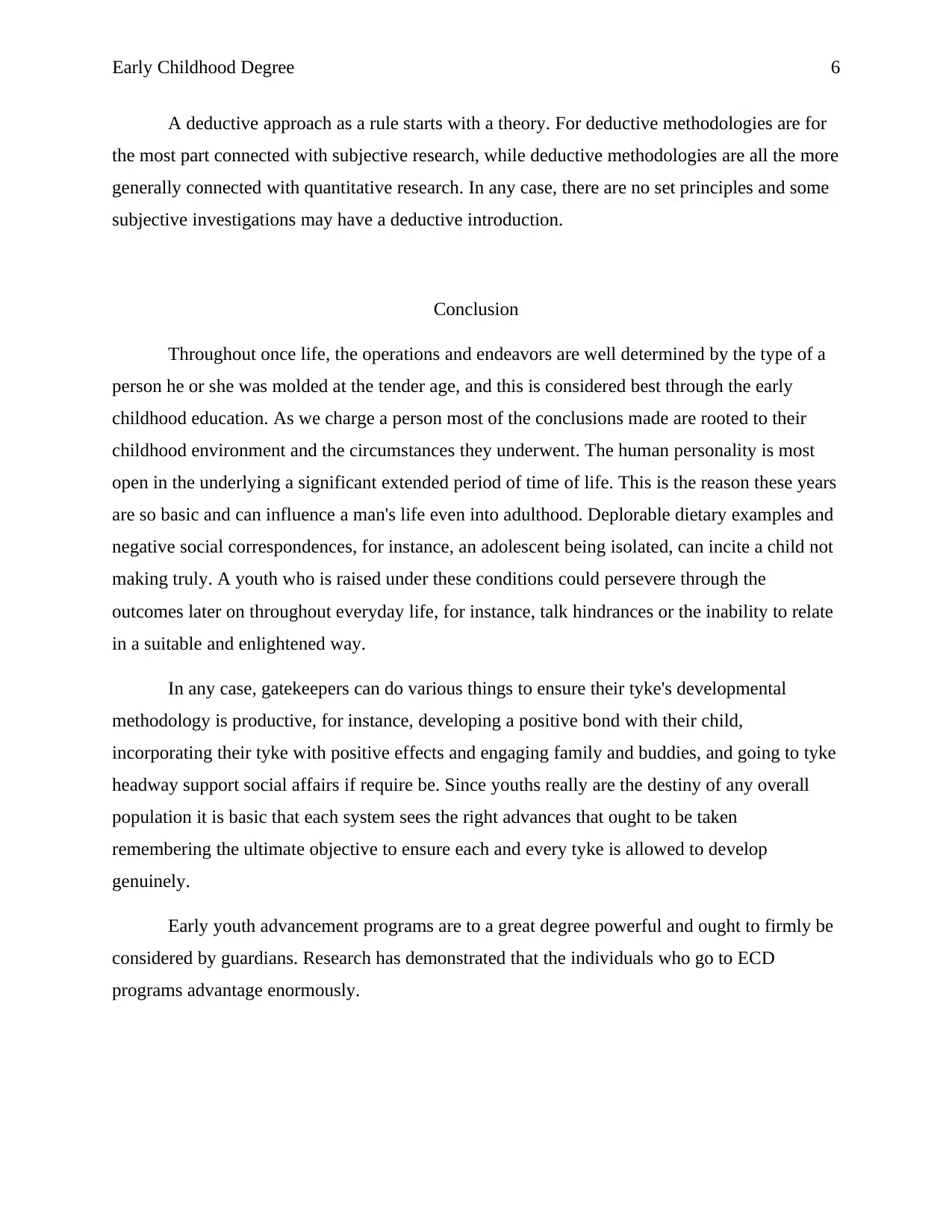
Early Childhood Degree 6
A deductive approach as a rule starts with a theory. For deductive methodologies are for
the most part connected with subjective research, while deductive methodologies are all the more
generally connected with quantitative research. In any case, there are no set principles and some
subjective investigations may have a deductive introduction.
Conclusion
Throughout once life, the operations and endeavors are well determined by the type of a
person he or she was molded at the tender age, and this is considered best through the early
childhood education. As we charge a person most of the conclusions made are rooted to their
childhood environment and the circumstances they underwent. The human personality is most
open in the underlying a significant extended period of time of life. This is the reason these years
are so basic and can influence a man's life even into adulthood. Deplorable dietary examples and
negative social correspondences, for instance, an adolescent being isolated, can incite a child not
making truly. A youth who is raised under these conditions could persevere through the
outcomes later on throughout everyday life, for instance, talk hindrances or the inability to relate
in a suitable and enlightened way.
In any case, gatekeepers can do various things to ensure their tyke's developmental
methodology is productive, for instance, developing a positive bond with their child,
incorporating their tyke with positive effects and engaging family and buddies, and going to tyke
headway support social affairs if require be. Since youths really are the destiny of any overall
population it is basic that each system sees the right advances that ought to be taken
remembering the ultimate objective to ensure each and every tyke is allowed to develop
genuinely.
Early youth advancement programs are to a great degree powerful and ought to firmly be
considered by guardians. Research has demonstrated that the individuals who go to ECD
programs advantage enormously.
A deductive approach as a rule starts with a theory. For deductive methodologies are for
the most part connected with subjective research, while deductive methodologies are all the more
generally connected with quantitative research. In any case, there are no set principles and some
subjective investigations may have a deductive introduction.
Conclusion
Throughout once life, the operations and endeavors are well determined by the type of a
person he or she was molded at the tender age, and this is considered best through the early
childhood education. As we charge a person most of the conclusions made are rooted to their
childhood environment and the circumstances they underwent. The human personality is most
open in the underlying a significant extended period of time of life. This is the reason these years
are so basic and can influence a man's life even into adulthood. Deplorable dietary examples and
negative social correspondences, for instance, an adolescent being isolated, can incite a child not
making truly. A youth who is raised under these conditions could persevere through the
outcomes later on throughout everyday life, for instance, talk hindrances or the inability to relate
in a suitable and enlightened way.
In any case, gatekeepers can do various things to ensure their tyke's developmental
methodology is productive, for instance, developing a positive bond with their child,
incorporating their tyke with positive effects and engaging family and buddies, and going to tyke
headway support social affairs if require be. Since youths really are the destiny of any overall
population it is basic that each system sees the right advances that ought to be taken
remembering the ultimate objective to ensure each and every tyke is allowed to develop
genuinely.
Early youth advancement programs are to a great degree powerful and ought to firmly be
considered by guardians. Research has demonstrated that the individuals who go to ECD
programs advantage enormously.
⊘ This is a preview!⊘
Do you want full access?
Subscribe today to unlock all pages.

Trusted by 1+ million students worldwide
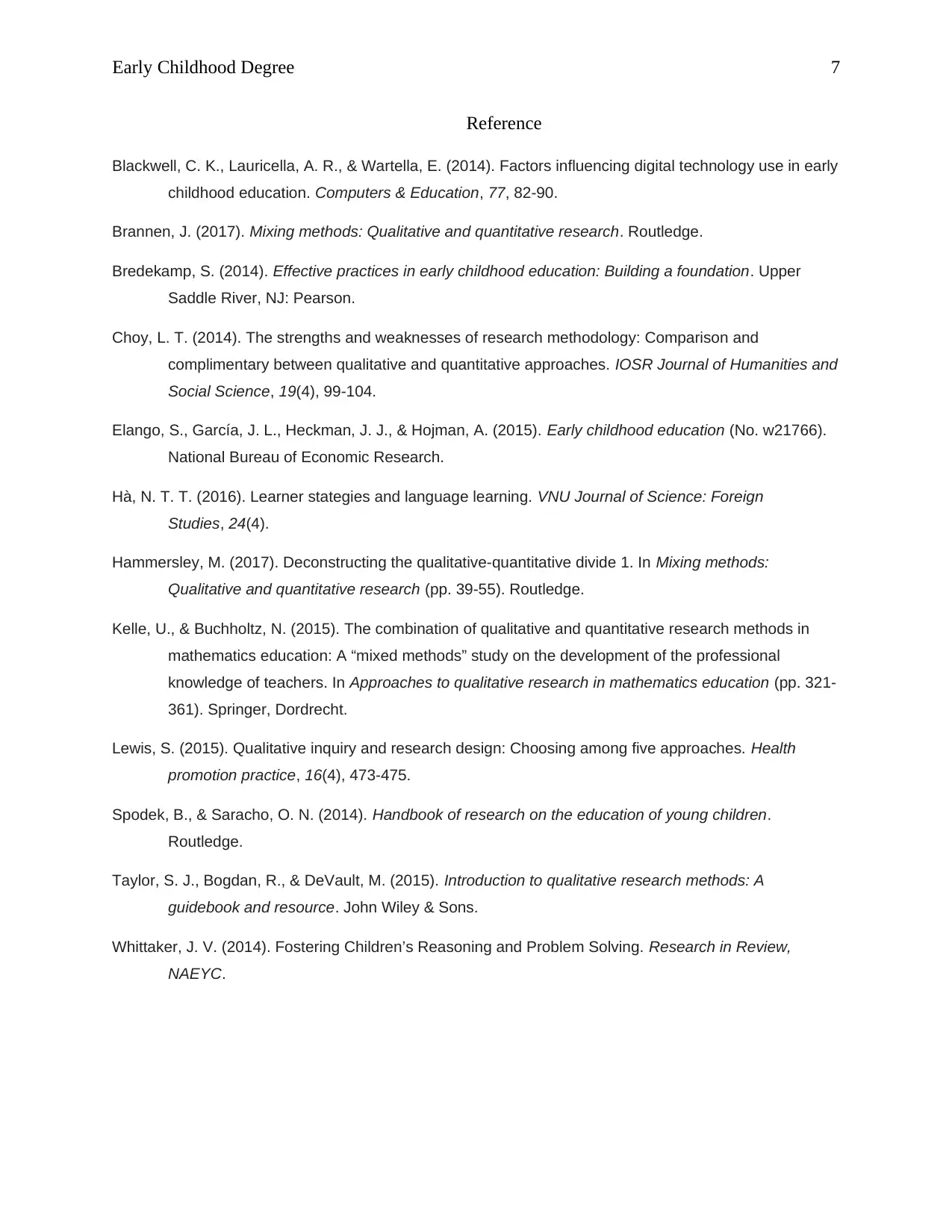
Early Childhood Degree 7
Reference
Blackwell, C. K., Lauricella, A. R., & Wartella, E. (2014). Factors influencing digital technology use in early
childhood education. Computers & Education, 77, 82-90.
Brannen, J. (2017). Mixing methods: Qualitative and quantitative research. Routledge.
Bredekamp, S. (2014). Effective practices in early childhood education: Building a foundation. Upper
Saddle River, NJ: Pearson.
Choy, L. T. (2014). The strengths and weaknesses of research methodology: Comparison and
complimentary between qualitative and quantitative approaches. IOSR Journal of Humanities and
Social Science, 19(4), 99-104.
Elango, S., García, J. L., Heckman, J. J., & Hojman, A. (2015). Early childhood education (No. w21766).
National Bureau of Economic Research.
Hà, N. T. T. (2016). Learner stategies and language learning. VNU Journal of Science: Foreign
Studies, 24(4).
Hammersley, M. (2017). Deconstructing the qualitative-quantitative divide 1. In Mixing methods:
Qualitative and quantitative research (pp. 39-55). Routledge.
Kelle, U., & Buchholtz, N. (2015). The combination of qualitative and quantitative research methods in
mathematics education: A “mixed methods” study on the development of the professional
knowledge of teachers. In Approaches to qualitative research in mathematics education (pp. 321-
361). Springer, Dordrecht.
Lewis, S. (2015). Qualitative inquiry and research design: Choosing among five approaches. Health
promotion practice, 16(4), 473-475.
Spodek, B., & Saracho, O. N. (2014). Handbook of research on the education of young children.
Routledge.
Taylor, S. J., Bogdan, R., & DeVault, M. (2015). Introduction to qualitative research methods: A
guidebook and resource. John Wiley & Sons.
Whittaker, J. V. (2014). Fostering Children’s Reasoning and Problem Solving. Research in Review,
NAEYC.
Reference
Blackwell, C. K., Lauricella, A. R., & Wartella, E. (2014). Factors influencing digital technology use in early
childhood education. Computers & Education, 77, 82-90.
Brannen, J. (2017). Mixing methods: Qualitative and quantitative research. Routledge.
Bredekamp, S. (2014). Effective practices in early childhood education: Building a foundation. Upper
Saddle River, NJ: Pearson.
Choy, L. T. (2014). The strengths and weaknesses of research methodology: Comparison and
complimentary between qualitative and quantitative approaches. IOSR Journal of Humanities and
Social Science, 19(4), 99-104.
Elango, S., García, J. L., Heckman, J. J., & Hojman, A. (2015). Early childhood education (No. w21766).
National Bureau of Economic Research.
Hà, N. T. T. (2016). Learner stategies and language learning. VNU Journal of Science: Foreign
Studies, 24(4).
Hammersley, M. (2017). Deconstructing the qualitative-quantitative divide 1. In Mixing methods:
Qualitative and quantitative research (pp. 39-55). Routledge.
Kelle, U., & Buchholtz, N. (2015). The combination of qualitative and quantitative research methods in
mathematics education: A “mixed methods” study on the development of the professional
knowledge of teachers. In Approaches to qualitative research in mathematics education (pp. 321-
361). Springer, Dordrecht.
Lewis, S. (2015). Qualitative inquiry and research design: Choosing among five approaches. Health
promotion practice, 16(4), 473-475.
Spodek, B., & Saracho, O. N. (2014). Handbook of research on the education of young children.
Routledge.
Taylor, S. J., Bogdan, R., & DeVault, M. (2015). Introduction to qualitative research methods: A
guidebook and resource. John Wiley & Sons.
Whittaker, J. V. (2014). Fostering Children’s Reasoning and Problem Solving. Research in Review,
NAEYC.
1 out of 7
Your All-in-One AI-Powered Toolkit for Academic Success.
+13062052269
info@desklib.com
Available 24*7 on WhatsApp / Email
![[object Object]](/_next/static/media/star-bottom.7253800d.svg)
Unlock your academic potential
Copyright © 2020–2026 A2Z Services. All Rights Reserved. Developed and managed by ZUCOL.

